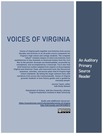
Conditional Remix & Share Permitted
CC BY-NC-SA
From Voices of Virginiia, edited by Jessica Taylor and Emily Stewart. Lesson Plan 1: Prohibition includes a lesson plan, audio, transcript, historical context, narrator biography, and discussion questions. Objectives (VUS.8): Students will be able to analyze an oral history from the 1920’s and identify the key historical factors (e.g., cars, Prohibition, corruption) the speaker is describing. Students will be able to connect the oral history to the historical context of The Great Gatsby. Students will understand important historical and cultural elements of the 1920s. About Voices of Virginia: http://hdl.handle.net/10919/96912 Feedback welcome: https://bit.ly/VoicesOfVirginia
- Subject:
- American History
- Virginia History
- Material Type:
- Lesson Plan
- Author:
- Anita Walz
- Date Added:
- 03/30/2020